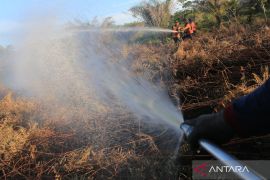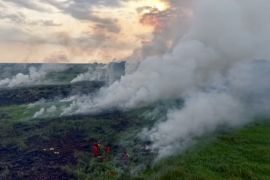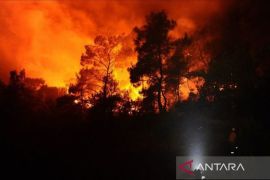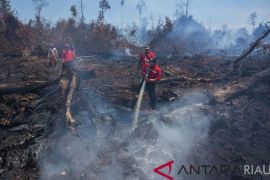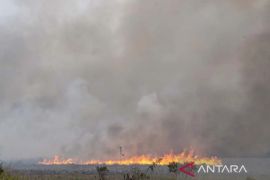People are suffering from acute respiratory infection, eye and skin irritations, and pneumonia.
These figures are based on data of the National Disaster Mitigation Agency (BNPB) about the human victims of the fires razing Indonesian forests, which are home to various species of flora and fauna, including some of the rarest ones, such as orangutans and Sumatran tigers.
So far, no data is available regarding animals that have become victims of the fires triggered by El Nino-induced drought. But reports from villagers living near the forest areas showed that the animals also suffered because of the fires.
Several different kinds of animals such as lizards, snakes, wild boars, and monkeys, have been found wandering around the human settlements as their habitat in Penukal Abab forest, Lematang Ilir, South Sumatra Province, has been razed by fires.
Local villagers were worried as wild animals entered the areas near their villages, Kardi, a resident of Suka Maju village, Talang Ubi Pendopo sub-district, said in Lematang Ilir, on Oct. 24.
Fires razed certain parts of the state-owned plantation company PTPN 7 area, he said.
"I am worried because snakes and lizards could attack villagers. People killed some animals for the sake of our safety," he stated.
Wild boars and monkeys damaged peoples gardens and farming areas, he added.
Herman, another villager, said over the last three days, local inhabitants killed five poisonous snakes after they chanced upon them.
Sani Firmansyah of WWF Indonesia said in Bandung, West Java, recently that protected animal species such as elephants and tigers in Sumatra and orangutans in Sumatra and Kalimantan are facing worrying condition due to the fires.
"Their condition is indeed worrying. Their health is affected by the haze (from the forest fires). Their habitats, the forests, have been gutted by fires, and water is scarce because of drought," he said.
He said WWF Indonesia is still collecting statistics about the impact of the fires on animals.
It seems orangutans, the closest human relatives, were among the worst to suffer in the wildfires.
Over the last three months, the Central Kalimantan Natural Resource Conservation Agency (BKSDA) has rescued five orangutans who tried to escape from the haze, Yusuf Trismanto of BKSDA said recently.
The five orangutans were rescued while wandering near human settlements or farming areas in Katingan District, Pulang Pisau, and other regions, he stated.
On Oct 22, two orangutans believed to have escaped from the Sebangau National Park were rescued in Tumbang Nusa area.
The two orangutans, both sick, were taken to the Nyaru Menteng Orangutan Rescue Center for medical treatment.
The head of the Central Kalimantan BKSDA, Nandang Prinadi, said parts of the Sebangau and Tanjung Puting national parks have been razed by fires.
Despite the fires, the agency does not have a plan to evacuate orangutans because the blaze has been controlled, according to him.
However, he believed that the haze emanating from the forest fires might force more orangutans to leave their habitat in the Sebangau and Tanjung Puting National Parks.
In September, an orangutan, which literally means "person of forest," lost its way and entered a village as the endangered animal was trying to escape the forest fires in Sampit, East Kotawaringin District, Central Kalimantan.
"It has been several days since this orangutan (pongo pygmaeus morio) was spotted roaming around in the forest here. It has been seen eating leaves on the trees as there is nothing else to eat. But, in the evening, it might come down to the settlement area in search of food. Therefore, we are afraid that it might attack us," Jitu, an inhabitant of Sampit, said on Sept. 27.
The male orangutan, believed to be 11 years old, lost its way in a forest near the construction site of a water boom recreational park in Baamang sub-district.
On Sept. 29, the Sampit Natural Resources Conservation Office (BKSDA) finally managed to evacuate the lost orangutan to Pangkalan Bun orangutan conservation center, BKSDA Sampit Chief Muriansyah noted.
In East Kalimantan Province, fires have razed up to 200 hectares of land in the 1.8 thousand-hectare Samboja Lestari forest, which is inhabited by orangutans.
"We are yet to calculate the material losses inflicted by this disaster," Nico Hermanu, the spokesman for the Borneo Orangutan Survival Foundation (BOSF), whose head office is located in the forest, remarked on Sept. 25.
Since Sept. 23, parts of the Samboja Lestari forest area, 50 kilometers north of Balikpapan, have been gutted by fires, which have destroyed bushes and 15-year-old trees.
Meanwhile, the BOSF had set up a 1,852-hectare facility near the forest to rehabilitate and introduce 209 orangutans (Pongo pygmaeus) and 47 honey bears (Helarcto malayanus) into the wild.
"We are worried that our staff members and orangutans might fall ill due to the haze," Hermanu affirmed.
During the catastrophic 1997-98 forest fires in Kalimantan, up to eight thousand orangutans had lost their lives.
Unfortunately, NASA has forecast that the ongoing El Nino is developing and becoming stronger, and could be similar or even stronger than the 1997-1998 El Nino.
Even animals living in zoos are being affected by the haze.
At the Siantar Zoo in Pematangsiantar, North Sumatra Province, for instance, the haze has affected the health of animals.
"Several animals are suffering due to illnesses caused by the haze, particularly bird species that are highly sensitive to weather changes," Melza Ulfa, the medical personnel at Siantar Zoo, said recently.
Melza pointed out that the high level of air pollution has had a major impact on the health of the animals.
Several animals were sick, suffering from eye irritation and respiratory infections because they ended up inhaling air polluted by haze.
"We are intensively treating a quail that is suffering from influenza. Today, its condition has improved," the doctor remarked.
The management of Siantar Zoo is also intensifying the treatment of animals in cages and is maintaining food hygiene. The zookeeper is also adding more vitamins to the animals diet to boost their health.
She said hundreds of trees that were planted in the zoo also helped purify the air, thereby improving the health of the animals.
The haze also led to a 10 percent drop in the number of visitors to the zoo.
Purmanto, the zoos public relations officer, said the fall in number of visitors was being attributed to the fact that some people in North Sumatra Province had chosen to reduce their outdoor activities.
The zoo management hoped that the government would immediately extinguish the forest fires that caused haze. ***4***
(T.F001/A/KR-BSR/A014) 27-10-2015 23:34:41
Reporter: Fardah
Editor: Fardah Assegaf
Copyright © ANTARA 2015
